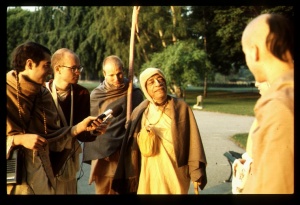SB 10.71.13: Difference between revisions
m (1 revision(s)) |
(Vanibot #0018 edit: make synonym terms in Sanskrit italic in SB - Vanisource) |
||
| Line 1: | Line 1: | ||
{{info | {{info | ||
|speaker= | |speaker=Śukadeva Gosvāmī | ||
|listener=King | |listener=King Parīkṣit | ||
}} | }} | ||
[[Category:Srimad-Bhagavatam - Canto 10 Chapter 71]] | |||
[[Category:Bhagavatam Verses Spoken by Sukadeva Gosvami - Vanisource|107113]] | |||
<div style="float:left">'''[[Srimad-Bhagavatam]] - [[SB 10|Tenth Canto]] - [[SB 10.71: The Lord Travels to Indraprastha|Chapter 71: The Lord Travels to Indraprastha]]'''</div> | |||
<div style="float:right">[[File:Go-previous.png|link=SB 10.71.12]] '''[[SB 10.71.12]] - [[SB 10.71.14]]''' [[File:Go-next.png|link=SB 10.71.14]]</div> | |||
{{RandomImage}} | |||
{{SBnotice}} | |||
==== TEXT 13 ==== | ==== TEXT 13 ==== | ||
<div | <div class="verse"> | ||
nirgamayyāvarodhān svān | :nirgamayyāvarodhān svān | ||
sa-sutān sa-paricchadān | :sa-sutān sa-paricchadān | ||
saṅkarṣaṇam anujñāpya | :saṅkarṣaṇam anujñāpya | ||
yadu-rājaṁ ca śatru-han | :yadu-rājaṁ ca śatru-han | ||
sūtopanītaṁ sva-ratham | :sūtopanītaṁ sva-ratham | ||
āruhad garuḍa-dhvajam | :āruhad garuḍa-dhvajam | ||
</div> | </div> | ||
| Line 19: | Line 24: | ||
==== SYNONYMS ==== | ==== SYNONYMS ==== | ||
<div | <div class="synonyms"> | ||
''nirgamayya''—making go; ''avarodhān''—wives; ''svān''—His; ''sa''—with; ''sutān''—their sons; ''sa''—with; ''paricchadān''—their baggage; ''saṅkarṣaṇam''—Lord Balarāma; ''anujñāpya''—taking leave of; ''yadu-rājam''—the King of the Yadus (Ugrasena); ''ca''—and; ''śatru-han''—O killer of enemies (Parīkṣit); ''sūta''—by His driver; ''upanītam''—brought; ''sva''—His; ''ratham''—chariot; ''āruhat''—He mounted; ''garuḍa''—of Garuḍa; ''dhvajam''—whose flag. | |||
</div> | </div> | ||
{{SBcollapse}} | |||
==== TRANSLATION ==== | ==== TRANSLATION ==== | ||
<div | <div class="translation"> | ||
O slayer of enemies, after He had arranged for the departure of His wives, children and baggage and taken leave of Lord Saṅkarṣaṇa and King Ugrasena, Lord Kṛṣṇa mounted His chariot, which had been brought by His driver. It flew a flag marked with the emblem of Garuḍa. | O slayer of enemies, after He had arranged for the departure of His wives, children and baggage and taken leave of Lord Saṅkarṣaṇa and King Ugrasena, Lord Kṛṣṇa mounted His chariot, which had been brought by His driver. It flew a flag marked with the emblem of Garuḍa. | ||
</div> | </div> | ||
| Line 33: | Line 38: | ||
==== PURPORT ==== | ==== PURPORT ==== | ||
<div | <div class="purport"> | ||
Having accepted Uddhava's proposal, Lord Kṛṣṇa first proceeded with His wives, family and entourage to the royal city of Indraprastha, the capital of the Pāṇḍavas. The rest of this chapter describes Lord Kṛṣṇa's journey to that city and how He was received there by His loving devotees. In Indraprastha Lord Kṛṣṇa explained to the Pāṇḍavas His plan to first kill Jarāsandha and then perform the Rājasūya sacrifice, and with their full agreement He proceeded, with Bhīmasena, to settle accounts with the wicked king. | Having accepted Uddhava's proposal, Lord Kṛṣṇa first proceeded with His wives, family and entourage to the royal city of Indraprastha, the capital of the Pāṇḍavas. The rest of this chapter describes Lord Kṛṣṇa's journey to that city and how He was received there by His loving devotees. In Indraprastha Lord Kṛṣṇa explained to the Pāṇḍavas His plan to first kill Jarāsandha and then perform the Rājasūya sacrifice, and with their full agreement He proceeded, with Bhīmasena, to settle accounts with the wicked king. | ||
Viśvanātha Cakravartī Ṭhākura explains that Lord Kṛṣṇa's wives had also been invited to the Rājasūya sacrifice and were eager to go. The description of the colorful royal procession begins with the following verse. | Viśvanātha Cakravartī Ṭhākura explains that Lord Kṛṣṇa's wives had also been invited to the Rājasūya sacrifice and were eager to go. The description of the colorful royal procession begins with the following verse. | ||
</div> | </div> | ||
__NOTOC__ | </div> | ||
</div> | |||
<div style="float:right">[[File:Go-previous.png|link=SB 10.71.12]] '''[[SB 10.71.12]] - [[SB 10.71.14]]''' [[File:Go-next.png|link=SB 10.71.14]]</div> | |||
__NOTOC__ | |||
__NOEDITSECTION__ | |||
Revision as of 18:32, 1 December 2017

A.C. Bhaktivedanta Swami Prabhupada
Please note: The synonyms, translation and purport of this verse were composed by disciples of Śrīla Prabhupāda
TEXT 13
- nirgamayyāvarodhān svān
- sa-sutān sa-paricchadān
- saṅkarṣaṇam anujñāpya
- yadu-rājaṁ ca śatru-han
- sūtopanītaṁ sva-ratham
- āruhad garuḍa-dhvajam
SYNONYMS
nirgamayya—making go; avarodhān—wives; svān—His; sa—with; sutān—their sons; sa—with; paricchadān—their baggage; saṅkarṣaṇam—Lord Balarāma; anujñāpya—taking leave of; yadu-rājam—the King of the Yadus (Ugrasena); ca—and; śatru-han—O killer of enemies (Parīkṣit); sūta—by His driver; upanītam—brought; sva—His; ratham—chariot; āruhat—He mounted; garuḍa—of Garuḍa; dhvajam—whose flag.
Translation and purport composed by disciples of Śrīla Prabhupāda
TRANSLATION
O slayer of enemies, after He had arranged for the departure of His wives, children and baggage and taken leave of Lord Saṅkarṣaṇa and King Ugrasena, Lord Kṛṣṇa mounted His chariot, which had been brought by His driver. It flew a flag marked with the emblem of Garuḍa.
PURPORT
Having accepted Uddhava's proposal, Lord Kṛṣṇa first proceeded with His wives, family and entourage to the royal city of Indraprastha, the capital of the Pāṇḍavas. The rest of this chapter describes Lord Kṛṣṇa's journey to that city and how He was received there by His loving devotees. In Indraprastha Lord Kṛṣṇa explained to the Pāṇḍavas His plan to first kill Jarāsandha and then perform the Rājasūya sacrifice, and with their full agreement He proceeded, with Bhīmasena, to settle accounts with the wicked king.
Viśvanātha Cakravartī Ṭhākura explains that Lord Kṛṣṇa's wives had also been invited to the Rājasūya sacrifice and were eager to go. The description of the colorful royal procession begins with the following verse.